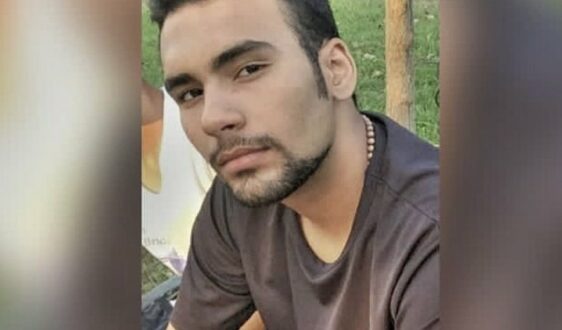Al-Monitor — The execution of Mohsen Shekari at a prison outside Tehran on Thursday unleashed a barrage of furious reactions from ordinary Iranians in the midst of the anti-government unrest that has engulfed Iran for nearly three months.
The early morning announcement on Thursday marked the first known death penalty carried out against a detainee arrested in the ongoing protests and sent shockwaves across Iran, fueling fears that the state was determined to go the extra mile in quelling the unrest with executions as a fear tactic.
The 23-year-old was found guilty of “Moharebeh” or “waging war on God” as part of a chain of ongoing trials of protesters that Amnesty International has described as “grossly unfair” and “marked by summary and predominantly secret processes.”
.@amnesty is horrified at today’s execution of protester Mohsen Shekari by Iranian authorities less than 3 weeks after sentencing him in a grossly unfair sham trial. His execution exposes the inhumanity of Iran’s so-called justice system as dozens of others face the same fate. pic.twitter.com/xwZ7lcc8oK— Amnesty Iran (@AmnestyIran) December 8, 2022
Shekari’s conviction was based on his participation in a protest in a west Tehran neighborhood, where he, according to the indictment, blocked off a road and caused injury to a member of the hard-line Basij militia forces with a machete.
During the anti-government protests that began in mid-September, at least 475 protesters, including 65 minors, have been killed by security forces, according to data collected by the Human Rights Activists News Agency.
Weeks into the trial, the Iranian judiciary had already vowed “no leniency” or tolerance for the arrested protesters, whose numbers are estimated to have passed the 18,000 mark. And only a day before Shekari’s sentence was carried out, Iran’s Supreme Leader Ayatollah Ali Khamenei, who has shown no sign of compromise to the protest movement, explicitly demanded punishment for “those who have closed off roads,” a message many interpreted as his green light for the death penalties to be accelerated.
Following the execution, posts were widely shared on social media by a university student and a documentary filmmaker, both of whom said they had been temporarily shared a ward with Shekari. They recounted experiences with the man and his “passion for life” and how he had dreamt of “becoming a YouTuber” once he was released, as he had been under the impression that authorities would never “execute a man for simply causing a few bruises.”
“You are the epitome of the suffering of the Iranian nation,” wrote elderly activist Gohar Eshghi, whose son, dissident blogger Sattar Beheshti, died in 2012 under torture while in custody. “You have blown the cover off the Islamic Republic’s barefaced crimes against humanity.”
The Shekari family, according to opposition publications, had not been notified about the imminent execution in breach of Iran’s own penal code, which stipulates that immediate family members be informed or present at the site of execution. The family was allegedly told that their son could still hope for release and that his appeal at the Supreme Court remained under review.
Later, a video showed a woman — said to be the executed man’s mother— weeping in agony outside her home in Tehran when the news was broken to her. Reposting it, popular former soccer player Mehdi Mahdavikia warned Iranian authorities of the costly consequences of the mother’s “painful cries.”
The moment the mother of Iranian protestor Mohsen Shekari, age 23, learns he’s been hanged for “waging war against God”. The regime told her to stay silent to win his release. This execution was meant to deter further dissent, but likely does the opposite. pic.twitter.com/FdX9uWIcKw— Karim Sadjadpour (@ksadjadpour) December 9, 2022
On Twitter, a Persian hashtag for Shekari hat already hit four million on Friday, with many Iranians noting that the execution was a “declaration of war” on the protesters. Some argued that pressure must be increased on the Iranian authorities to make them think twice before hanging another protester.
The France-based Iranian actress Golshifteh Farahani described the execution as the Islamic Republic “digging its own grave.” And her former colleague in Tehran, Taraneh Alidoosti, reminded everyone that silence is not an option and only serves as an expression of “support to the oppressors.” She also shamed international organizations for watching “this bloodshed” and refusing to take action.
Despite the growing rage and widespread messages of condemnation both at home and abroad, Iran’s hard-line officials appeared more than defiant and renewed their support for the deadly crackdown and the executions.
“The state will continue to find, put to trial and punish the rioters,” declared President Ebrahim Raisi, who himself is facing international accusations over his role as a former judge in the mass execution of thousands of jailed dissidents in 1988.
And in a speech to a gathering of clerics in the southern city of Minab, ultraconservative and influential cleric Ahmad Khatami extended his “gratitude” to the judiciary for exhibiting “firmness” by “sending the first rioter to the gallows.”
 Shabtabnews In this dark night, I have lost my way – Arise from a corner, oh you the star of guidance.
Shabtabnews In this dark night, I have lost my way – Arise from a corner, oh you the star of guidance.



